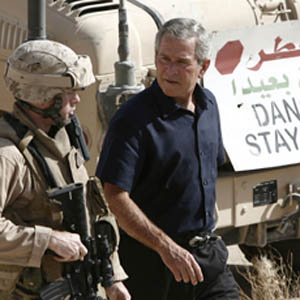Signals

During recent weeks, George Bush has shifted his focus onto the developments of Iraq. The U.S. President aims to send out signals by his visit to Iraq. The first signal is for the Congress and Democrats.
On the verge of the release of Congress’s security report on Iraq, he wants to send a message to his opponents: that Iraq is entering the security phase. Nuri Maleki’s strategy is productive and the U.S. President faces no threats in visiting this country.
George Bush’s proof for this claim is the reduction in American troops’ casualties compared with the last three months. The daily toll of 5 soldiers has dropped off to 2 soldiers.
Previously 55 unidentified bodies related to the victims of sectarian violence were discovered every day, a number which has now been decreased to 18. Iraqi security officials consider it a sign of the success of Nuri Maleki’s security plan.
The number of explosive-filled vehicles and suicide bombings has fallen drastically. On the other hand, political progress has accelerated. Even the dissidents are contemplating joining the political progress. These are the signs that can be the motives for George Bush’s trip to Iraq and consequently sending signals to the inside of the United States and Middle East.
Which countries in the region should we address?
Saudi Arabia, Axis of Moderation, Turkey and U.S. are against Maleki. They believe that he should be dismissed, replaced by a decisive, religiously balanced government. The U.S. wants to alert Iran that it’s following Iran-Iraq ties and it’ll not leave Iraq in the hands of an influential Iran.
The United States wants the Iraqis to know that it’ll remain in their country as long as it’s necessary. Also it wants to tell Europe that a cut in the number of European troops and withdrawal of British from Basra to its international airport, besides Gordon Brown’s pledge on the possibility of pulling out British Armed Forces from Iraq by the end of 2007, should be considered as an improvement in the security of Iraq.
The international troops are actually scheduling for the withdrawal covertly. If they reveal their withdrawal timetable, they’ve offered a perfect gift to the terrorists. All these can be motives and reasons for Bush’s visit of Iraq.
George Bush’s negotiations with Iraq’s P.M. will be an important event, regarding Maleki’s recent move on expelling from Iraq’s security body a great number of individuals affiliated with paramilitary forces.
As I believe, due to the formation of Iraq’s army as a military institute and an improvement in the conditions and security of Iraq, George Bush will make an unexpected move. This will probably be transferring part of American troops’ responsibility to Iraqi security forces and therefore United States will move towards indirect reduction of its troops in Iraq.
Along with establishing peace in Iraq, U.S. will have enough time to work on Iran’s case. That may be why the recent statements of Mr. Ryan Crocker, United States’ ambassador and political envoy in Iraq should be taken seriously. He announced that United States is ready to negotiate with Iran.
The previous meetings weren’t fruitful, but America is interested in the productivity of the upcoming meetings. Now that the conditions seem satisfying and signal a relative improvement in Iraq’s situation, the United States declares its tendency towards negotiations, since U.S. believes Iran can be asked for more cementing of this situation and for the success of Mr. Bush’s general strategy in Iraq.

